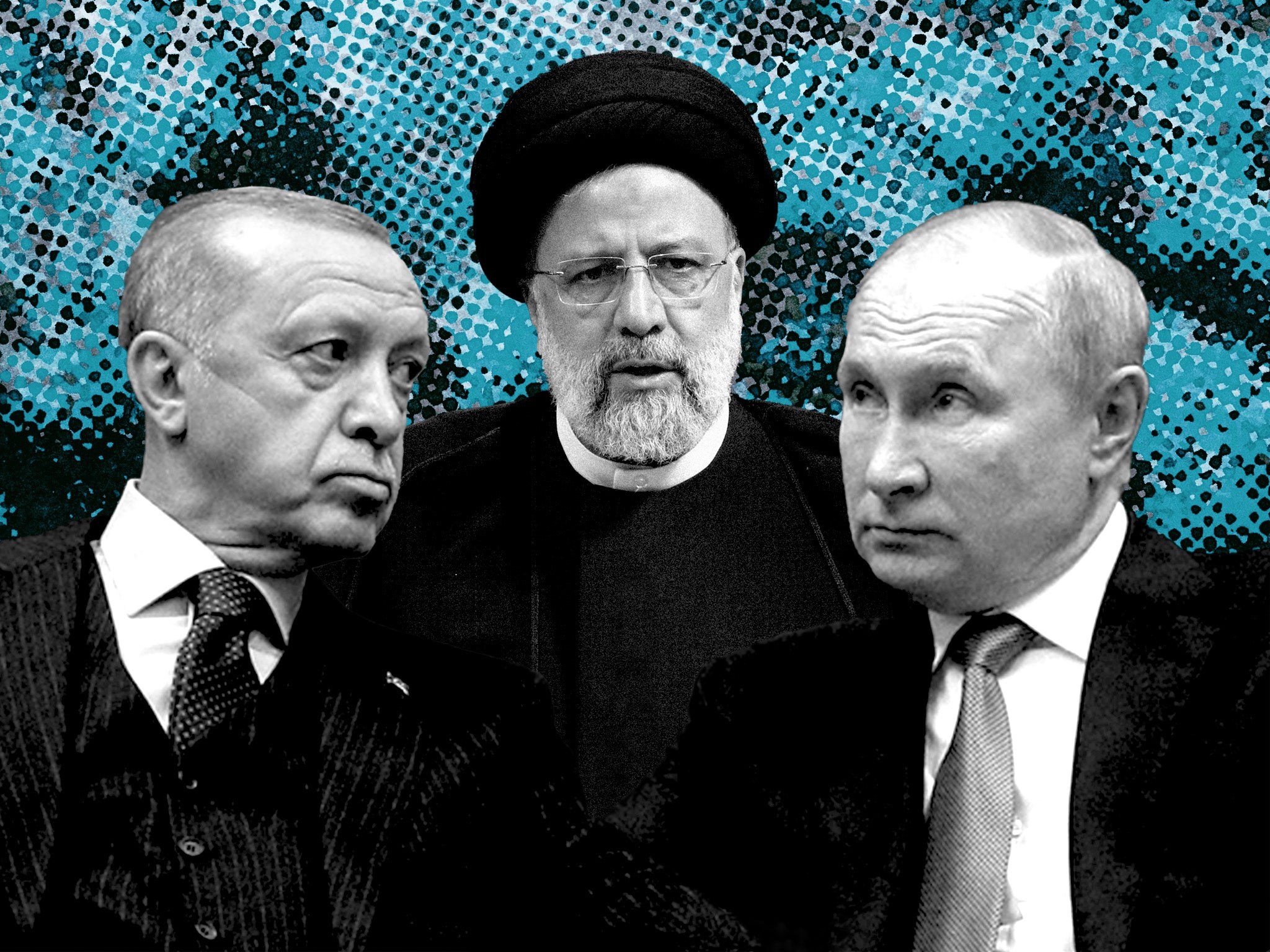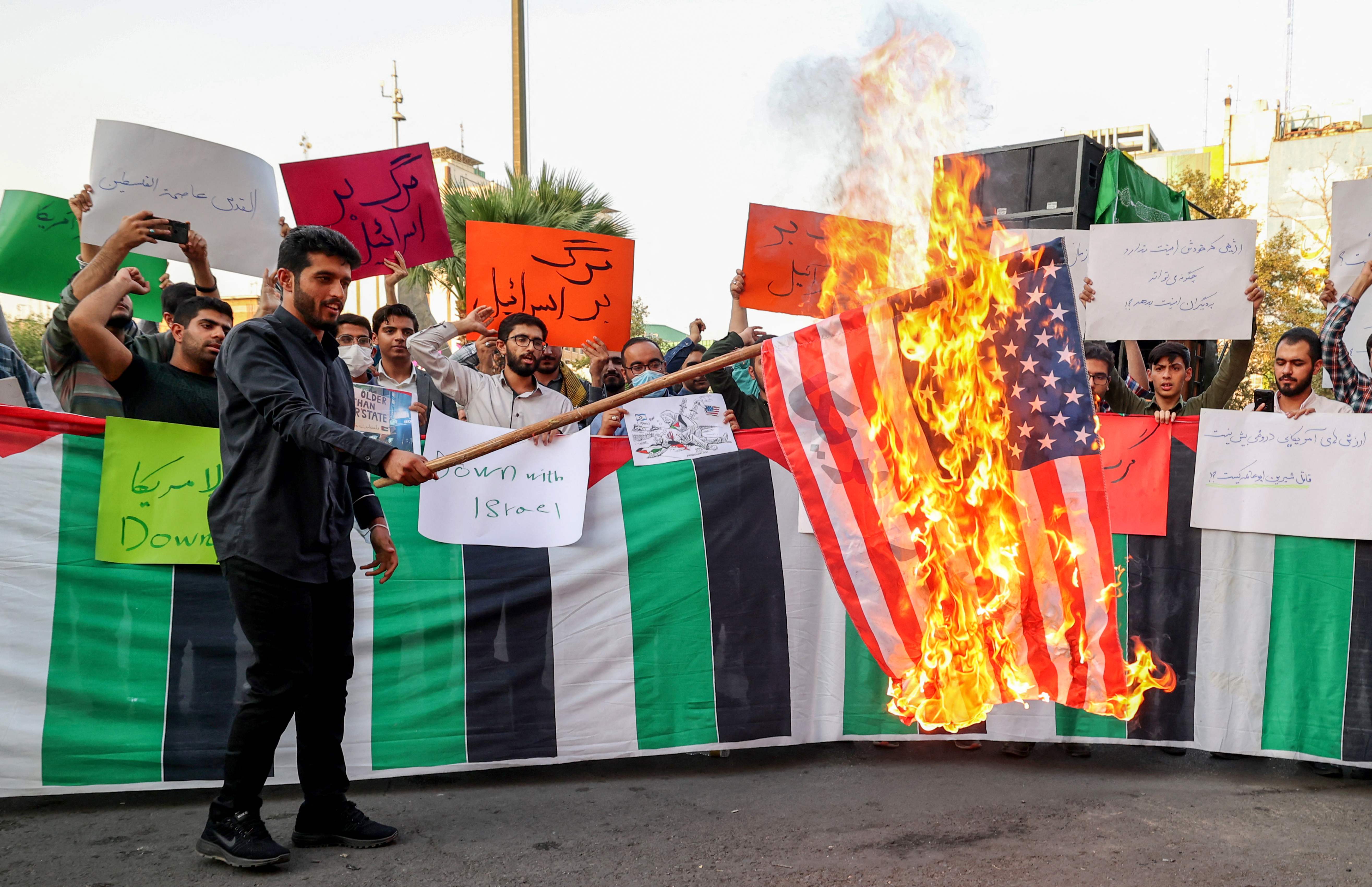With friends like these: Putin, Erdogan and Raissi to meet in Tehran
Reports that Iran is planning to sell Russia hundreds of combat drones in what would be a milestone in relations between the two adversaries of the US

The leaders of Russia and Turkey are meeting in Iran this week in a show of unity and potential military alignment that acts as a stark geopolitical counterpoint to the recent visit by the American president to its primary Middle Eastern partners.
Presidents Vladimir Putin and Recep Tayyip Erdogan are scheduled to meet on Tuesday in Tehran with their Iranian hosts, including supreme leader Ali Khamenei and the country’s president, Ebrahim Raissi.
Syria is the ostensible main topic of the meeting, which is being held as part of a five-year diplomatic effort to resolve the war between Bashar Assad’s regime and rebel groups. But there has been little momentum or urgency regarding Syria in recent months. And with the US declaring its aims to isolate Iran over its nuclear programme and Russia over its invasion of Ukraine, other security matters will almost certainly come to the fore.
Iran, Russia, and Turkey – a Nato member whose relations with the alliance have been strained of late – will seek to highlight the futility of American efforts to contain or challenge them.
“Europe and the US put pressure on everyone, demanding that all relations with Moscow be broken off,” commentator Dmitry Evstafiev was quoted as saying in the Russian newspaper Komsomolskaya Pravda. “Now, after four months of hostilities, we can safely talk about the failure of the boycott.”
Mr Biden visited Israel and Saudi Arabia last week, to shore up relations with countries Washington considers friends and to present a united front against both Iran and Russia. The timing of the Tehran summit appears to have been selected to immediately follow Mr Biden’s much-criticised trip to the Middle East.
Experts say Russian and Iranian interests have grown increasingly aligned in recent years.
“What we’ve seen since the Ukraine war started is that Russia has paid a lot more attention to its relationship with Iran, and upgraded its importance,” said Nicole Graweski, a researcher specialising in Russia-Iran relations at Harvard University’s Belfer Centre for Science and International Affairs.
Among the most groundbreaking dimensions of the visit are reports highlighted by US and Iranian officials that Tehran is selling combat drones to Russia. White House official Jake Sullivan alleged that Russian military officials had visited an Iranian military base twice this month to observe the drones in action.
“To our knowledge, this is the first time a Russian delegation has visited this airfield for such a showcase,” Mr Sullivan told reporters.
Iran’s foreign minister, Hossein Amir-Abdollahian, reportedly denied that Tehran was preparing to provide Russia with weapons, but Iran’s diplomats are often kept in the dark about such matters by senior officials in the Revolutionary Guard who oversee military and security matters.
Selling weapons to a nuclear power would mark a milestone for Iran.
Tehran has for decades been a customer of arms from China and Russia, but it has recently alarmed Western and Middle Eastern diplomats by investing in a native drone-production programme. Iran opened a drone factory in Tajikistan in May as part of an effort to build up its arms industry following the lifting of international sanctions in 2020.
Iran has also been accused of transferring such weaponry to non-state powers, such as Lebanon’s Hezbollah and Yemen’s Houthi militia, which is fighting Saudi Arabia in an armed conflict that has gone on for more than seven years.
“The drones they will be providing to Russians will be the same they sell to Houthis,” said Ms Graweski. “The fact that Russians are relying on Iranian technology is something important. It shows it’s not just a one-way relationship, especially when it comes to military technology.”
Iranian and Russian officials will also reportedly discuss attempts to conduct trade in local currencies, in an effort to bypass American sanctions.
“We will probably move away from [dollarised trading] as we develop our cooperation in the banking financial sector,” Kremlin spokesperson Dmitry Peskov said in an interview aired on Russian and Iranian state television ahead of Mr Putin’s departure.
President Putin’s visit to Tehran will be only his second trip abroad since Russia’s 24 February invasion of Ukraine, which started a war that continues to rage. It will be the Russian leader’s first visit to Iran since 2017.
While the trip has apparently been planned for some time, the symbolism of having the leaders of two Eurasian powers visit Iran within days of Mr Biden’s declaration that he would team up with Middle Eastern partners such as Israel and Saudi Arabia to curtail Tehran’s ambitions is undeniable.

Mr Erdogan’s presence highlights a Turkish foreign policy that has demonstrated maximum diplomatic flexibility. While maintaining strong diplomatic, business and military ties with the West, especially Europe, Turkey has also repaired its relations with Arab autocracies and with Israel, maintained robust commercial and political ties with Iran, and managed to maintain relations not only with Russia but also with Ukraine, to which it sells combat drones.
Moscow, Ankara and Kyiv are currently negotiating with the United Nations over terms to establish a grain corridor and a coordination office in Turkey, in order to get wheat and other staples from eastern Europe out of the Black Sea and to the rest of the world amid a global food crisis. A Kremlin adviser is reported to have said that Mr Putin would discuss the grain export office with Mr Erdogan during the Tehran meeting.
Turkey is also seeking a green light from Moscow to move against Kurdish fighters and political groups in northern Syria, where Russia, the Damascus regime, American forces, and various armed groups are vying for dominance.
Join our commenting forum
Join thought-provoking conversations, follow other Independent readers and see their replies
Comments